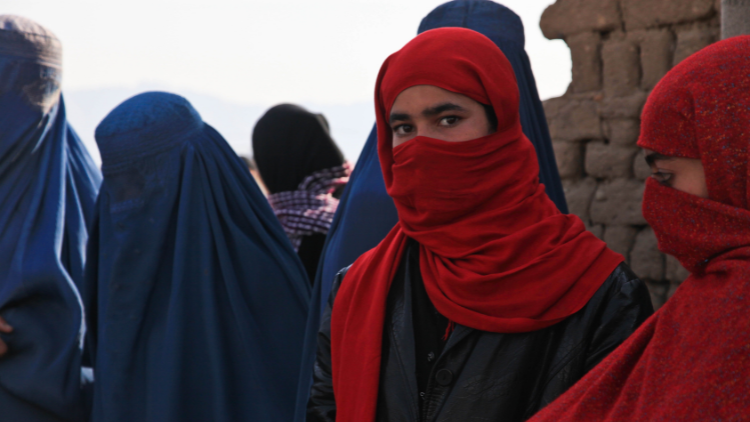LGBTQIA+
Dark abyss which swallowed my dreams

Women in Afghanistan
© Army Amber from Pixabay via CanvaProAfter two decades, Taliban returned to Afghanistan in August 2021. From the moment they seized power in Afghanistan, they have been imposing various gender norms and excluding women from education, work, entertainment and other social, political and economic activities, and all the while women have been facing severe violence and discrimination. Moreover, lesbians, bisexual women, and queer individuals (LBQ) have been facing an even more appalling situation of exclusion and discrimination due to the country's conservative and patriarchal society and homophobic socio-cultural norms. The situation has become particularly dire, given the current political instability and the Taliban's recent takeover of the country.
Afghanistan is a country where homosexuality is illegal and punishable by death under Sharia law. This law has been enforced in the past via the former Republic government of Afghanistan penal code[1], and there are reports of LBQ individuals being targeted and subjected to violence and discrimination. In addition, women in Afghanistan face significant gender-based violence and discrimination and at times are subject to the death sentence. In fact, the situation has exacerbated for LBQ individuals.
The Taliban's takeover of the country has further worsened the situation for LBQ individuals in Afghanistan. The interpretation of the Sharia law made by the Taliban is particularly harsh, and they have a history of targeting LBQ individuals. The Taliban's treatment of LBQ individuals has been documented by human rights organizations, with reports of LBQ individuals being executed or subjected to brutal punishments, including stoning and whipping.[2]
Fatima, a 26-year-old lesbian, has an uncle who is a prominent religious leader allied with the Taliban. From the moment the Taliban has returned to power, “the world has become a dark abyss for me that is trying to swallow my dreams, my happiness, my peace, my achievements, my education, my job,” says Fatima. At the time she was working in a local university, but was forced out of her job and replaced by a man who is a Taliban loyalist.[3]
LBQ individuals in Afghanistan are also at risk of forced marriage, which is prevalent across the country. Forced marriages often result in women being trapped in abusive relationships and denied any agency or autonomy over their lives. LBQ individuals are particularly vulnerable to forced marriages, as their sexual orientation is often seen as a threat to the patriarchal norms of the Afghan society.
Najwa, a 31-year-old lesbian, fled her hometown in northern Afghanistan when Taliban forces recaptured nearby territory. She revealed that her uncle who beat her in the past for refusing to get married was now a Taliban commander, and she is worried he will use his new power to finally force her to marry. She has been constantly changing her location and is trying to evade her relatives. Since the Taliban seized power in Afghanistan she has faced severe violence from her relatives for refusing to marry.[4]
The situation for LBQ individuals in Afghanistan is further complicated due to the lack of support and resources available to them. LBQ individuals in Afghanistan are forced to remain hidden and are unable to access any support mechanism or resources that might be available to them in other countries. LBQ individuals are also unable to access any medical or mental health services that are tailored to their specific needs.
To support and protect LBQ individuals in Afghanistan in this tough situation, it is crucial to raise awareness about the challenges being faced by LBQ individuals in the country. Many people are unaware of the discrimination, violence, and harassment that these individuals experience on a daily basis. By highlighting these issues through media coverage, social media campaigns, and public advocacy, we can build greater public support for the protection of LBQ individuals' rights. On Lesbian Day of Visibility, one of the first advocacy organizations for LGBTQIA+ rights in Afghanistan, the Afghan LGBT organization urged international humanitarian organizations and media to stand with Afghanistan's LBQ individuals.[5]
In conclusion, LBQ individuals in Afghanistan face significant challenges, including discrimination, violence, and a lack of support and resources. The Taliban's recent takeover of the country has further worsened the situation for LBQ individuals, and it is essential that the international community takes action to support LBQ individuals in Afghanistan and to ensure their human rights are protected, and their voices are heard.
[1] Article 427, Afghanistan Penal Code 2018
[2] LGBT+ Afghans in hiding, fearing death under Taliban | Reuters
[3] A Mountain on My Shoulders: 18 Months of Taliban Persecution of LGBTIQ Afghans | Outright International
[4] A Mountain on My Shoulders: 18 Months of Taliban Persecution of LGBTIQ Afghans | Outright International
[5] From Surviving to struggling for visibility: Afghanistan Lesbian women hard live under the Taliban - Afghan LGBT Organization
